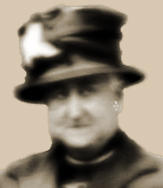"Oh, bless them. Aren't they brave?"
Readers who are familiar with those events from Lady Bracknell's earlier life which the talented Mr Wilde saw fit to recreate so prettily on the stage will no doubt recall that her ladyship was reported by the great playwright as uttering the following words:
"On an occasion of this kind it becomes more than a moral duty to speak one's mind. It becomes a pleasure".
It would appear that the screens of our televisual devices are soon to be assaulted with a further series of the wholly execrable Beyond Boundaries.
Once again, Joseph and Josephine Non-Disabled Public will have the opportunity to derive "inspiration" from the fact that a dozen or so persons who happen to have impairments have put themselves forward for an adventure holiday.
No doubt all the impairments will again be of a highly visible nature. After all, the dramatic impact would be much diluted if, heaven forfend, any of the participants could pass as "normal". Where would the interest be in watching a group of people with - let us say for the sake of hypothesis - dyslexia, diabetes, bipolar disorder and RSI wandering about the African bush?
From whence would the frisson of voyeuristic distaste derive if the camera could not swoop in at every opportunity and focus at interminable length on the "unsightly" stumps of persons who are missing an arm/leg/eye/head (delete where applicable)?
The reactions of J & J N-D P to the last series fulfilled all of Lady Bracknell's and others' worst fears. Immediate and unwarranted assumptions were made that there is nothing that the average crip would enjoy more than an arduous trek through inhospitable jungle surroundings. Worse, it was assumed that we could all do it if we really tried. And that those of us who had the temerity to criticise such a marvellous programme were traitors to our own community.
(Lady Bracknell is reminded at this juncture of the occasion on which she visited a newly-disabled friend in hospital. Mr O had just been given some "encouraging" magazines to read, and was less than entirely enthused by their content. "I hadn't the slightest desire to go abseiling before I was in a wheelchair," he said. "Why on earth would anyone assume that my preferences have changed just because my legs no longer work?")
It is no more the purpose on this earth of disabled persons to make their non-disabled counterparts feel relieved that they themselves "don't have anything wrong with them" than it is the purpose of gay and lesbian persons to make their straight counterparts feel relieved that they have the "good fortune" to be heterosexual. In a truly equal society, such comparisons would be entirely meaningless. Non-disabled people are quite capable of feeling guilty about the fact that they take less exercise than they feel they ought to without any comparison with a handful of disabled people who happen to enjoy physical challenges.
No doubt, as last year, the thunderous voice-over at the beginning of the programme will conclude (in a tone of astonishment) with the words,
"And they are all physically disabled!!!!!"
So angered is Lady Bracknell by this nonsense that she is forced to descend to an unwontedly vulgar use of the modern idiom, and reply, "So bloody what?"
Even those of us who are proud of our political identities as disabled people have a very great deal more to offer the world than the simple fact of our impairments. We are, first and foremost, people. Our interests and our characters are as diverse as any reasonable person would expect to find in any other comparably large sector of the population. It does us no favours at all to be publicly portrayed as "overcoming" our impairments. Such a portrayal merely emphasises the disempowering notion that an impairment actually needs to be overcome if we are to function as valuable members of society. And that, dear readers, is utter poppycock.
In Lady Bracknell's considered opinion, Beyond Boundaries is only one step up - and a shallow one, at that - from the old end of the pier freakshows at which one was invited to marvel at the fact that a man with no arms could shave himself.
"On an occasion of this kind it becomes more than a moral duty to speak one's mind. It becomes a pleasure".
It would appear that the screens of our televisual devices are soon to be assaulted with a further series of the wholly execrable Beyond Boundaries.
Once again, Joseph and Josephine Non-Disabled Public will have the opportunity to derive "inspiration" from the fact that a dozen or so persons who happen to have impairments have put themselves forward for an adventure holiday.
No doubt all the impairments will again be of a highly visible nature. After all, the dramatic impact would be much diluted if, heaven forfend, any of the participants could pass as "normal". Where would the interest be in watching a group of people with - let us say for the sake of hypothesis - dyslexia, diabetes, bipolar disorder and RSI wandering about the African bush?
From whence would the frisson of voyeuristic distaste derive if the camera could not swoop in at every opportunity and focus at interminable length on the "unsightly" stumps of persons who are missing an arm/leg/eye/head (delete where applicable)?
The reactions of J & J N-D P to the last series fulfilled all of Lady Bracknell's and others' worst fears. Immediate and unwarranted assumptions were made that there is nothing that the average crip would enjoy more than an arduous trek through inhospitable jungle surroundings. Worse, it was assumed that we could all do it if we really tried. And that those of us who had the temerity to criticise such a marvellous programme were traitors to our own community.
(Lady Bracknell is reminded at this juncture of the occasion on which she visited a newly-disabled friend in hospital. Mr O had just been given some "encouraging" magazines to read, and was less than entirely enthused by their content. "I hadn't the slightest desire to go abseiling before I was in a wheelchair," he said. "Why on earth would anyone assume that my preferences have changed just because my legs no longer work?")
It is no more the purpose on this earth of disabled persons to make their non-disabled counterparts feel relieved that they themselves "don't have anything wrong with them" than it is the purpose of gay and lesbian persons to make their straight counterparts feel relieved that they have the "good fortune" to be heterosexual. In a truly equal society, such comparisons would be entirely meaningless. Non-disabled people are quite capable of feeling guilty about the fact that they take less exercise than they feel they ought to without any comparison with a handful of disabled people who happen to enjoy physical challenges.
No doubt, as last year, the thunderous voice-over at the beginning of the programme will conclude (in a tone of astonishment) with the words,
"And they are all physically disabled!!!!!"
So angered is Lady Bracknell by this nonsense that she is forced to descend to an unwontedly vulgar use of the modern idiom, and reply, "So bloody what?"
Even those of us who are proud of our political identities as disabled people have a very great deal more to offer the world than the simple fact of our impairments. We are, first and foremost, people. Our interests and our characters are as diverse as any reasonable person would expect to find in any other comparably large sector of the population. It does us no favours at all to be publicly portrayed as "overcoming" our impairments. Such a portrayal merely emphasises the disempowering notion that an impairment actually needs to be overcome if we are to function as valuable members of society. And that, dear readers, is utter poppycock.
In Lady Bracknell's considered opinion, Beyond Boundaries is only one step up - and a shallow one, at that - from the old end of the pier freakshows at which one was invited to marvel at the fact that a man with no arms could shave himself.











8 Comments:
Lady Bracknell, thou art indeed wise. Gorse Fox tried to watch one episode of the previous series but found the whole process rather distasteful. Nay, voyeuristic.
It is indeed uplifting to know that people of widely differing abilities can take on such a challenge. Is it, however, entertainment? Gorse Fox thinks not.
Maybe the one saving grace for such a televisual event is that it may make people more aware that having a disability does not mean having no ability.
Take care, and stay well.
I am so sick of having disabled people measured by their ability to take part in non-disabled people's activities.
Plenty of able-bodied people couldn't trek through a jungle, either, and wouldn't want to, already having lives of their own.
I consider myself most fortunate that I only saw about 2 minutes of the previous seties. In the small extract I did see a wheelchair user was being hauled through quite a lot of mud. What a positive picture that painted. The poor cripple being helped to get through the jungle. Utter nonsense. I shall not be watching even a jot of the new series.
On a related subject The Boy Marmite had to switch off Radio 5 this morning lest he smashed his radio to tiny pieces. There was an article on the Eamonn Holmes Show this morning interviewed Paraolympic swimmer of some repute. Good news!! Er, no. hat could have been a positive article about a great athlete was ruined by Holmes repeatedly saying it was an amazing story!!
So the man with one leg won a swimming medal! So bloody what!!
Her Ladyship got me all wound up about this subject again, prompting an outburst on my own blog.
I really do not see the point of it. There have been numerous incidences where aeroplane have crashed in the jungle, and the passengers suddenly acquired impairments.
Ask one of survivors what they thought of the format.
Nobody is suggesting that disabled persons shouldn't partake in whatever activity they choose to.
And the participants in the first series may well have been persuaded that the challenges they faced would be portrayed in an objective and non-voyeuristic light. Which is why Lady Bracknell's criticism of that series was confined to its method of portrayal, and not extended to any of the disabled individuals who took part.
However, as with other reality TV shows, e.g. Big Brother, the participants in the second series will find it very hard indeed to complain post-broadcast that they did not sign up to be presented as medical curiosities.
I am grateful to BBC America for many of the programs they make available to American viewers, but if this one comes here, I'll have to skip it. I could be the RSI character in Lady Bracknell's proposed show, but I don't want to visit the African bush. Still, by the time it got through all the network hoops, who knows where it would take place . . . .
Veuillez agréer, Madame, l’expression de mes sentiments les plus distingués.
Why is it no-one ever finds it entertaining to stick a bunch of "able bodied" people in wheelchairs and see how they do playing wheelchair basketball? wheelchair rugby? the 100 meter wheelchair dash across the road before the lights change?
of course, my opinion is simply that we're a lot better at doing "able bodied" things than "able bodied" people are at doing "our" things. got to feel sorry for them, really, don't you? :)
Post a Comment
<< Home